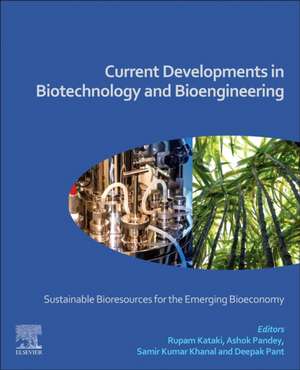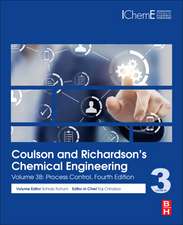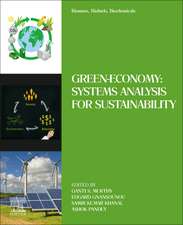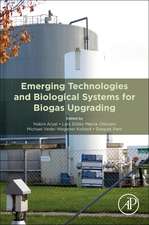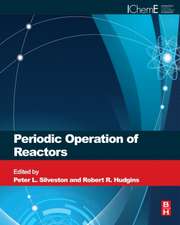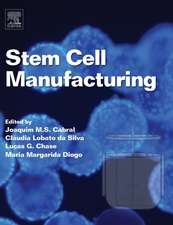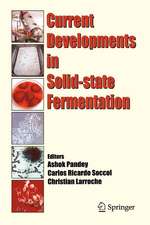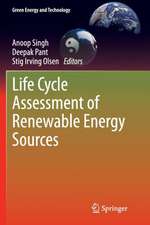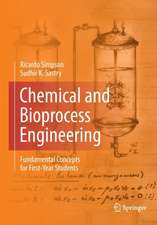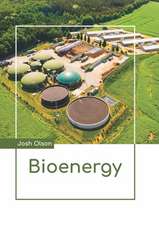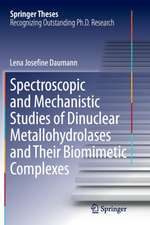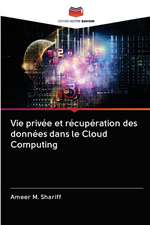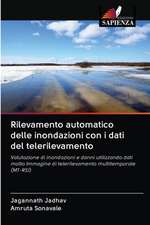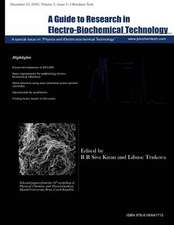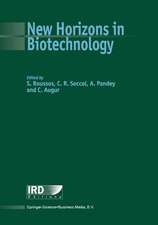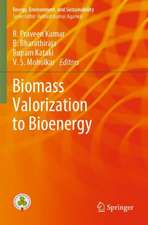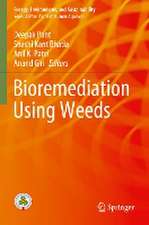Current Developments in Biotechnology and Bioengineering: Sustainable Bioresources for the Emerging Bioeconomy
Editat de Rupam Kataki, Ashok Pandey, Samir Kumar Khanal, Deepak Panten Limba Engleză Paperback – 10 iul 2020
The book provides comprehensive information starting from early progress to the latest trends on bioenergy, biorefinery and bioeconomy with special reference to the developed and the developing countries and the linkage between bioeconomy and climate change mitigation in simple scientific language to appeal to a wider audience.
- Includes the fundamentals and concepts of biomass and bioenergy
- Outlines recent technology development for biomass conversion
- Provides concept for different bioproducts
- Covers global strategies and policies on the development of bioeconomies
Preț: 992.72 lei
Preț vechi: 1297.42 lei
-23% Nou
Puncte Express: 1489
Preț estimativ în valută:
190.02€ • 206.47$ • 159.72£
190.02€ • 206.47$ • 159.72£
Carte tipărită la comandă
Livrare economică 14-28 aprilie
Preluare comenzi: 021 569.72.76
Specificații
ISBN-13: 9780444643094
ISBN-10: 0444643095
Pagini: 536
Dimensiuni: 191 x 235 mm
Greutate: 0.91 kg
Editura: ELSEVIER SCIENCE
ISBN-10: 0444643095
Pagini: 536
Dimensiuni: 191 x 235 mm
Greutate: 0.91 kg
Editura: ELSEVIER SCIENCE
Public țintă
Post-graduates students, researchers in Chemical Engineers, Biochemical Engineers, Biotechnologists working in academic institutes, research institutes, industries and governmental agencies, Engineering Companies, Process Engineering, Chemical Plants, waste management plants, and policy makers.Cuprins
SECTION A: Potential Bioresources
1. Bioresources and their significance: prospects and obstacles
2. Valorization of agricultural wastes for multi-dimensional use
3. Vermicomposting: Earthworms as potent bioresources for biomass conversion
4. Unconventional bioresources and their prospects: focus on spent-straw and biochar
5. Agro-based industrial wastes as potent sources of alternative energy and organic fertilizers
6. Biowaste to Biogas Production: Recent Microbial and Technological Updates
7. Merging the margins for beneficial biofuels: An Indian perspective
8. An evaluation of different climate matrices used in biomass energy research
9. Resource recovery from wastewater: a new approach with alkaline dehydration of urine at source
10. Circular Economy: Transforming Useless Solid-Wastes to Useful Products
SECTION B: Economics of bioresources
11. Industrial Perspective of Food Preservatives from Microbial Origin
12. Gasification Technologies and Their Energy Potentials
SECTION C: Economic sustainability of the bioresources
13. Sustainability analysis of large scale composting of food-wastes
14. Valorization of Municipal Solid Waste in Bio-refineries for the Creation of a Circular Economy: Role of Emerging Technologies
15. Sustainable agriculture, fishery and forestry for a bioeconomy
16. Bio-economy and Environmental Sustainability: A Social, Political and Scientific Nexus Framework for Life Cycle Sustainability Assessment
17. Biomass energy with carbon capture and storage (BECCS)
SECTION D: Alternative approaches in bioeconomy of bioresources
18. Ayurveda and its role in Indian bioeconomy
19. Bio-village as a model for bioeconomy
20. Aquaponics for Resource Recovery and Organic Food Productions
21. Traditional bioeconomy versus modern technology-based bioeconomy
1. Bioresources and their significance: prospects and obstacles
2. Valorization of agricultural wastes for multi-dimensional use
3. Vermicomposting: Earthworms as potent bioresources for biomass conversion
4. Unconventional bioresources and their prospects: focus on spent-straw and biochar
5. Agro-based industrial wastes as potent sources of alternative energy and organic fertilizers
6. Biowaste to Biogas Production: Recent Microbial and Technological Updates
7. Merging the margins for beneficial biofuels: An Indian perspective
8. An evaluation of different climate matrices used in biomass energy research
9. Resource recovery from wastewater: a new approach with alkaline dehydration of urine at source
10. Circular Economy: Transforming Useless Solid-Wastes to Useful Products
SECTION B: Economics of bioresources
11. Industrial Perspective of Food Preservatives from Microbial Origin
12. Gasification Technologies and Their Energy Potentials
SECTION C: Economic sustainability of the bioresources
13. Sustainability analysis of large scale composting of food-wastes
14. Valorization of Municipal Solid Waste in Bio-refineries for the Creation of a Circular Economy: Role of Emerging Technologies
15. Sustainable agriculture, fishery and forestry for a bioeconomy
16. Bio-economy and Environmental Sustainability: A Social, Political and Scientific Nexus Framework for Life Cycle Sustainability Assessment
17. Biomass energy with carbon capture and storage (BECCS)
SECTION D: Alternative approaches in bioeconomy of bioresources
18. Ayurveda and its role in Indian bioeconomy
19. Bio-village as a model for bioeconomy
20. Aquaponics for Resource Recovery and Organic Food Productions
21. Traditional bioeconomy versus modern technology-based bioeconomy
